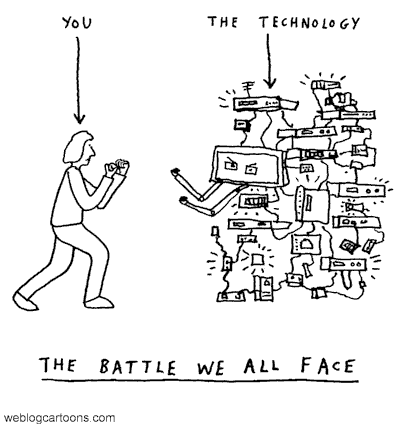One of the big lessons of the year was an exercise in giving up control of my classroom. You let your kids run wild like monkeys? No, not in the least. In fact I am usually pretty tough and demanding of my students. By control, I mean that I have tried to phase myself out of the role of "Chief Propagator of Knowledge." Here is where the fear sets in for many teachers. The fear comes from an unhealthy pairing of Authority and Control. Far too many teachers have confused these terms to mean the same thing, or have even melded the two into one ghastly beast that drives their teaching. When I talk to teachers many often talk of being tired and worn out from a long day of teaching. I know how they feel, because I ran the same race my first two years. Spewing out lesson upon lesson from all subject areas is a tiring task. I propose that far too many teachers are driving themselves towards burnout. It is sad to see the statistics of teachers leaving the profession or even the stats on job satisfaction. We truly have one of the most influential and meaningful jobs one can have. Somewhere along the line we have lost the passion that boiled out of as we loved our student teaching assignments, and the prospect of our own class. We all had big dreams and aspirations for our own classroom. How do we get that passion back?
To return to our passion, I believe we have to give up control of the classroom. When I say control, I am only talking about our role as teachers in creating a learning environment that centers its focus on a top down approach. Part of our goal as teachers should be to create learners who could still grow and succeed if the teacher dropped over dead. When we give up some of our control, we are opening the door for student ownership. Kids only seem to take a true active role in their learning, when they get grab the steering wheel for a time.
For my students this year, they have gone through distinct periods of change in dealing with having learning control. At first, many of the students acted as though they were put in charge of a complicated machine that made toys. They were scared of what to do, but they were excited about where this was going. The next phase I saw in my students was many of them doing the double take. They kept reflecting back on how their learning had been in the past, and asking ,"Will we be doing this the rest of the year?" It was almost as if they were scared to get their hopes up if this was just another rug to be pulled out from under them. The last period of change is ownership and active participation. Here are some of the things I qualify as being active students:
- Using Kidblog to actively blog their reflections on class lessons, summarize books they are reading, and explain math concepts in details.
- Posting to Edmodo, participating in polls that let me know what they enjoy in class, and creating reading group discussions.
- Creating their own group stories on Voicethread that shows the parts of a story. They also recorded the story to accompany the pictures.
- Importing pictures from Pics4Learning into Microsoft Word and creating informational reading.
- Writing with penpals in Texas through Epals, and recently took part in a Skype session with that classroom.
- Constructing group summaries on TypeWithMe for read alouds.
- Building self-reflection glogs on Glogster.
- Working individually and collaboratively on Sumdog, and Sokikom to reinforce math concepts.
What are you doing in your classroom to call your students to an active role? As the end of the year approaches, are you reflecting on what you should change for next year? A good idea for making changes would be to ask your students what they hope to do in the next grade. This will let you know if there are things the students enjoyed in your class, and what maybe you could add for your next class.





0 Comments